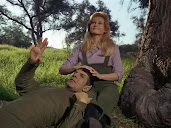 It is typical of utopia novels/tracts to start with "I met a man who told me about..." similar to Coleridge's "Rime of the Ancient Mariner."
It is typical of utopia novels/tracts to start with "I met a man who told me about..." similar to Coleridge's "Rime of the Ancient Mariner."
More's Utopia, for instance, is described by a traveler, Raphael, who claims the island was already populated when a group of Romans and Egyptians arrived there in a shipwreck. The resulting perfection is a combination of those cultures. James Hilton's Shangri-la is described by one man to another man based on the first man's encounter with Conway (the Ronald Colman character in the 1937 movie). Shangri-la is in the mountains and only reached by Conway and his companions when their plane is hijacked.
All versions of His in Herland have struggled with this problem. In one version, I created trade between Herland, an island, and the mainland over a bridge.
In the current version, I place Herland in a far more isolated position, even more isolated than in Gilman's book. In the book, the young men hear stories about the country (about the size of Holland) from guides plus they discover woven cloth in a river. Stuff leaks out.
The problem, of course, is that in reality, people also tend to leak out. Why wouldn't Utopia's fisherman keep going? Why wouldn't Herland's citizens up and leave? George Mallory isn't the only one who wanted to climb a mountain because it was there.
In fairness, Gilman's women are infinitely practical, which is a welcome change from rampaging idealism, but human nature is not infinitely practical, male or female. Road trips and rituals like Rumspringa exist for a reason. Good grief, Gilman got a divorce and hauled herself and a child all the way across the country to California--why wouldn't her women do the same? For that matter, at age 25, I drove cross-country in a non-air-conditioned Dodge Colt (stick shift) in the summer with a cat by myself. I would never do that now! (People get more risk-adverse as they age.)Even during Japan's most
extreme isolationist period, people still knew it was there and
eventually showed up in a "here we are; what are you going to do now?"
way. (And, yes, people did leave, even if they did so partly unintentionally. Courtesy of Eugene, see John Manjiro, "whose biography would barely be believable as fiction.")
In addition, one of the most fascinating revelations of
archeological digs is how much people in the past got around. Goods
from Asia show up in medieval England. Folks from England show up in the
Mediterranean world. 
Star
Trek tackled this problem in several ways (setting aside the utopian
ideals of the show itself). TOS tackled it philosophically: How can you thrive if you are too happy?
TNG tackled it, to my mind, somewhat more realistically. In
"Masterpiece Society," the engineers on the planet are too excited about
Enterprise technology to give it up. Now we see the cost of not being part of a space-faring community! No, thanks!
Welcome to human nature.
To avoid the plot issues created by constantly mobile people (hard to write a critique of a utopia if the upshot is, "Yeah, well, it lasted about ten minutes"), the current version of His in Herland is extremely isolated--though Terry suggests that even this state of affairs can't last.
People are always going to come.
Chapter 2

